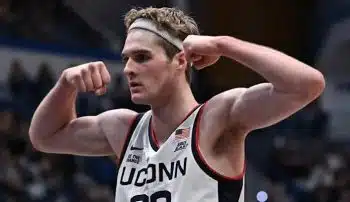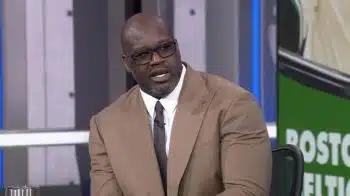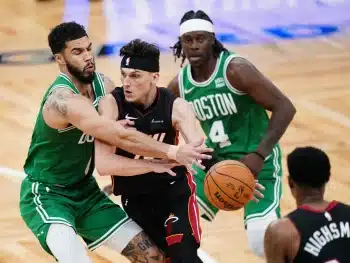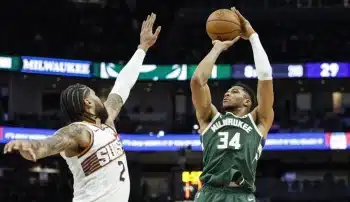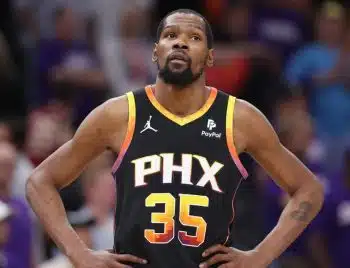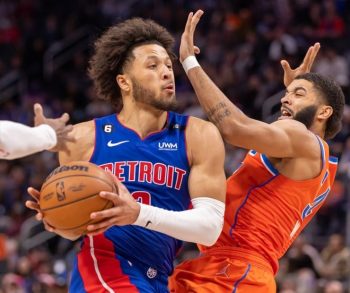NBA
NBA Daily: Giannis, In Perspective
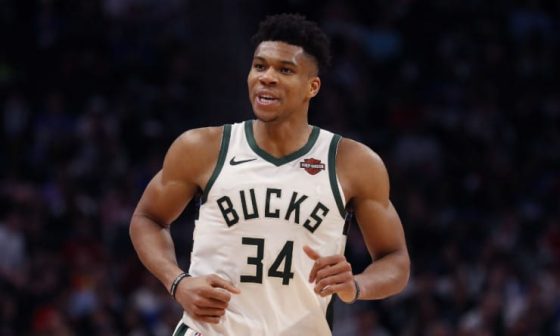
Last weekend, the Toronto Raptors handed the Milwaukee Bucks and Giannis Antetokounmpo their a fourth consecutive loss, an unforeseen fate that would eliminate the franchise with the best regular season record. The Bucks, somehow, had never racked up a losing streak longer than two games during the campaign — so four, in some ways, felt like a minor catastrophe. But for many, Milwaukee’s shortcomings meant that the metaphorical torch — mere moments away from being ceremoniously passed to Antetokounmpo — was, for now, extinguished.
In a conference ruled by LeBron James for nearly two decades, Antetokounmpo was the assumed successor, the rightful heir to a healthy collection of back-to-back-to-infinity Finals berths. Before Antetokounmpo had ever even won a playoff series, he was anointed as the next in line for the crown. Fair or not, Antetokounmpo had indeed seemed poised and willing — the Greek international averaged 27.7 points, 12.5 rebounds and 5.9 assists on 57.8 percent shooting in 2018-19, after all — but his recent setback seemed to loudly echo.
Although thwarted by the massively impressive Raptors, a Giannis-led showdown against the Warriors seemed fated until the very moment it was no longer possible. Instead, questions were levied in Antetokounmpo’s direction, curiously harsh for a gifted, young roster that ultimately came up just short at the last hurdle. In the theater of dramatics, Antetokounmpo had missed his golden opportunity to ascend to the upper-most throne, sent back to the Midwest to contemplate and reposition for the years ahead.
And yet, there’s a certain discomfort in crushing Antetokounmpo after their unexpected exit — the first of many grievances that appear to be rooted in an impatient narrative more than anything else.
Within all mainstream sports, the desire to fall back on revisionist history can be a poisonous beast. At just 24 years of age, Antetokounmpo is far ahead of schedule and, if he truly is destined for both the record books and Springfield, then the best is still to come.
In fact, at 24, Michael Jordan hadn’t yet reached the peak either, falling in five games to the Detroit Pistons during the Eastern Conference’s second round back in 1987-88. Notably, Jordan wouldn’t win his first NBA title until his seventh season — at 27 years old, no less — but perhaps Antetokounmpo deserves some extra slack on his end of the line. Jordan, of course, needs no formal introduction — and he reeled off six championships in a single decade once he got rolling — but no one ever faults the legend for not winning even earlier in his career.
Kobe Bryant outpaced Jordan by taking home Finals MVP in his fourth season — and at the age of 21 to boot — but if Antetokounmpo’s measuring points are against two of the league’s best-ever contributors, then that’s a battle the stretchy forward will likely never win. Kevin Durant — once also named as a prodigal son of basketball — reached the Finals with Oklahoma City in 2011-12, his fifth season and aged 23 years, only to lose in five games. Durant, who has practically locked down his status as one of the top 25 to ever play, didn’t win a ring until he joined the Warriors years down the line.
As far back as the mind can stretch, the NBA has always thrived on an insistent search for the next Jordan.
It has given us Kobe, LeBron, Kevin and — given his supreme dominance in recent postseasons — Kawhi Leonard. Certainly, to the newer generation of fans, the manhunt for the next James had begun some time ago. But despite his laundry list of achievements, awards and record-breaking performances, James didn’t win his first ring prior to 2012 himself — knocking out the aforementioned Durant — and that couldn’t happen until he left his hometown and teamed up with two other Hall of Famers in Miami.
Which, in a roundabout way, is to simply say: Give Giannis Antetokounmpo a break.
Before he tore up the NBA, Antetokounmpo had played just one season in the Greek A2 League, posting just 9.5 points and five rebounds per game, and arrived here in relative obscurity. As a lanky teenager that often dwarfed his unskilled opponents, nobody knew what type of player Antetokounmpo might become in the bigger and stronger overseas landscape. Even the Bucks, who selected him at No. 15 overall in 2013, were taking a major risk on a definite unknown. Since that moment, all Antetokounmpo has done is smashed every possible metric and projection, looking more and more like a perennial MVP candidate for the next decade or so.
Ho-hum.
Yet for some detractors, that may not be enough.
If the masses are so eager to crown Antetokounmpo as the next-best thing, the worst thing we as a collective unit — writers, media and fans alike — can do is harshly judge him for not clearing every difficult challenge immediately. Jordan didn’t do it until he was 27, James didn’t do it until his ninth year and after a major change in scenery. Charles Barkley and John Stockton never won at all and, at this point, Chris Paul may be headed down the same path. But facing off against the greats like Jordan and James will often seem insurmountable — but, as always, there can only be one winner each year.
Turns out, it wasn’t Giannis Antetokounmpo’s time this year but that’s perfectly acceptable too.
The things he’s achieved in Milwaukee already — like changing the culture in a small market city and building a championship-worthy contender — don’t happen overnight. Although Antetokounmpo has already vowed to come back even better in the fall, it shouldn’t dampen the fact that’s he already one of the most unique showstoppers in league history. Antetokounmpo helped to berth free-flowing, point forward unicorn movement, more or less officially changing the way basketball is played today.
He’s creative and overpowering, dynamic and charismatic — and, most importantly, a near-lock for 25-plus points per game as well.
Naturally, it would be disappointing if Antetokounmpo never hoists the Larry O’Brien trophy above his head — still, the Greek Freak is just 24 years-old, far removed from even considering that harsh reality. Being compared to Jordan, Bryant, James and Durant is a compliment higher than most athletes could ever dream of receiving — so why are we so obsessed with the culture of only counting some victories?
In lieu of wondering whether or not Antetokounmpo is the next LeBron or a rightful heir to the throne, onlookers should appreciate him for exactly what he is today, hopeful what he may become tomorrow. Instead of searching for someone to meet the impossible standards of yesteryear, we should be asking who the next Giannis will be — if ever repeating such a marvelous, enthralling feat is even possible.
